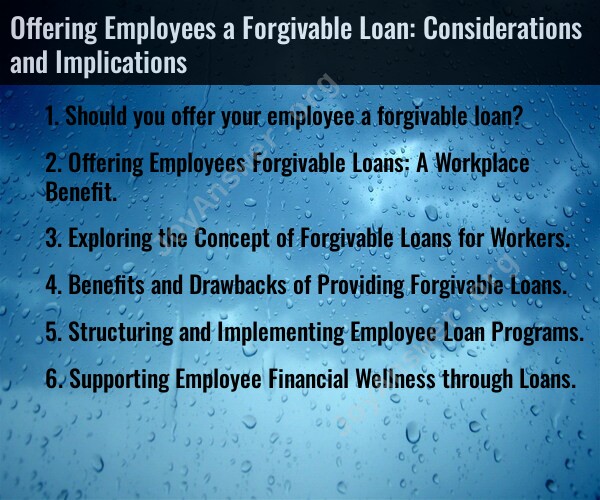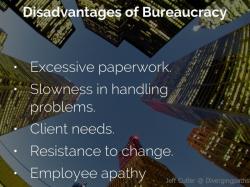Should you offer your employee a forgivable loan?
Offering an employee a forgivable loan is a complex decision that requires careful consideration and should be guided by specific circumstances and legal regulations. Forgivable loans are often used in the context of employer-employee relationships, particularly during times of financial hardship or economic uncertainty. Here are some key considerations and implications when offering an employee a forgivable loan:
Pros:
Employee Retention: Offering a forgivable loan can be a way to retain valuable employees who are facing financial challenges. This can help maintain a stable and skilled workforce.
Assistance in Emergencies: Forgivable loans can be especially useful during emergencies, such as medical crises or natural disasters, where employees may need financial support.
Support During Economic Downturns: In times of economic uncertainty, providing forgivable loans can help employees weather the storm without seeking employment elsewhere.
Cons:
Complexity: Forgivable loans can be legally complex and may require careful documentation, including a written agreement outlining the terms and conditions of the loan.
Legal and Tax Implications: Depending on the laws and regulations in your jurisdiction, offering a forgivable loan may have legal and tax implications for both the employer and the employee. It's advisable to consult with legal and financial professionals to understand these implications.
Impact on Company Finances: Providing forgivable loans can impact your company's cash flow and financial stability. You'll need to assess whether your business can afford to offer such loans.
Equity and Fairness: Consider how offering forgivable loans affects the overall compensation and benefits structure of your organization. Ensure that the process is fair and equitable for all employees.
Loan Forgiveness Criteria: Clearly define the conditions for loan forgiveness, such as continued employment with the company for a specified period. Be prepared for scenarios where an employee leaves the company before the forgiveness period is complete.
Written Agreement: It is essential to have a well-drafted written agreement that outlines the terms of the forgivable loan, including the loan amount, repayment schedule, interest (if any), and conditions for forgiveness. This agreement should be legally sound and protect the interests of both parties.
Confidentiality and Privacy: Be sensitive to the privacy and confidentiality of the employee's financial situation. Discuss and document these matters discreetly.
Employee Morale: Consider the potential impact on employee morale and relationships within the organization. Ensure that offering forgivable loans does not create tensions or resentments among other employees.
Before offering a forgivable loan to an employee, it is strongly recommended to seek advice from legal and financial professionals who can guide you through the legal and financial implications and ensure compliance with applicable laws and regulations. Every situation is unique, so careful consideration and due diligence are essential to make an informed decision that benefits both the employee and the employer.
Offering Employees Forgivable Loans: A Workplace Benefit
Forgivable loans are a type of employee loan that is forgiven over time, typically in exchange for the employee's continued service with the company. Employers offer forgivable loans to employees for a variety of reasons, such as to attract and retain top talent, to help employees with financial hardship, or to invest in employees' professional development.
Exploring the Concept of Forgivable Loans for Workers
Forgivable loans can be a valuable benefit for both employees and employers. Employees can use forgivable loans to help pay for education, housing, or other expenses. Employers can use forgivable loans to attract and retain top talent, to reward employees for their hard work, or to invest in employees' professional development.
Benefits and Drawbacks of Providing Forgivable Loans
There are a number of benefits to providing forgivable loans to employees, including:
- Increased employee morale and satisfaction
- Reduced employee turnover
- Increased employee productivity
- Enhanced company reputation
However, there are also some potential drawbacks to consider, such as:
- Tax implications for the employer and employee
- Potential for abuse by employees
- Administrative costs
Structuring and Implementing Employee Loan Programs
When structuring an employee loan program, it is important to consider the following factors:
- The purpose of the loan program
- The eligibility requirements for employees
- The maximum loan amount
- The interest rate (if any)
- The repayment terms
- The forgiveness terms
It is also important to have a written loan agreement in place that outlines the terms and conditions of the loan.
Supporting Employee Financial Wellness through Loans
Forgivable loans can be a valuable tool for supporting employee financial wellness. By providing employees with access to affordable loans, employers can help employees to achieve their financial goals, reduce financial stress, and improve their overall well-being.
Here are some tips for supporting employee financial wellness through forgivable loans:
- Offer forgivable loans for a variety of purposes, such as education, housing, and professional development.
- Make the loan program easy to understand and access.
- Provide financial education and counseling to employees.
- Work with employees to create a realistic repayment plan.
- Be flexible and understanding with employees who are struggling to repay their loans.
Overall, forgivable loans can be a valuable benefit for both employees and employers. When structured and implemented correctly, forgivable loans can help employees to achieve their financial goals, reduce financial stress, and improve their overall well-being.













